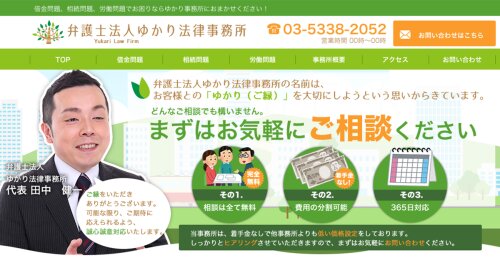Best Divorce & Separation Lawyers in Tokyo
Share your needs with us, get contacted by law firms.
Free. Takes 2 min.
Free Guide to Hiring a Family Lawyer
List of the best lawyers in Tokyo, Japan
About Divorce & Separation Law in Tokyo, Japan
Japan has its own unique set of laws and customs surrounding divorce and separation. In Tokyo, as throughout Japan, there are four legally recognized methods for obtaining a divorce: divorce by agreement (kyogi rikon), divorce by mediation in a family court (chotei rikon), divorce by decision of the family court (shimpan rikon), and divorce by judgment of the district court (saiban rikon). Divorce by agreement is the most common and simplest method, but in cases where an agreement cannot be reached, the other methods may be pursued. It is important for those seeking a divorce in Tokyo to understand the specific requirements and implications of each process, including matters concerning child custody, asset division, and potential alimony.
Why You May Need a Lawyer
While many couples in Japan opt for divorce by mutual agreement, which doesn't necessarily require legal representation, there are situations that can benefit from a lawyer's expertise. These situations include disputes over assets and finances, disagreements regarding child custody and visitation, a spouse being a foreign national unfamiliar with the Japanese legal system, and cases of domestic violence or other complications. A lawyer can help navigate the complexities of family law, represent your interests, and provide vital legal advice to ensure a fair outcome.
Local Laws Overview
The key aspects of divorce and separation laws in Tokyo, which are consistent with Japan's national laws, are as follows:
- Divorce by mutual consent is recognized without the need for court involvement if both parties agree on important matters such as property division and child custody.
- If the parties cannot reach an agreement, they can apply for mediation at a family court. If mediation fails, they can seek a decision by the family court or file a lawsuit in the district court.
- In terms of property division, Japan follows the principle of 'property acquired by cooperation' which tends to favor the division of assets accumulated during the marriage.
- When it comes to child custody, the primary concept is shinken, similar to parental responsibility, wherein only one parent becomes the custodial parent after the divorce.
- Alimony is not automatically granted; it depends on several factors including the income disparity between spouses and the standard of living during the marriage.
Frequently Asked Questions
1. How long does the divorce process take in Tokyo?
The duration of a divorce process in Tokyo can vary significantly. An uncontested divorce by agreement can be accomplished relatively quickly, potentially in a matter of weeks. Contested divorces that require court involvement can take several months to years, depending on the complexity of the case.
2. What are the grounds for divorce in Japan?
There are several grounds for divorce under Japanese law, including infidelity, desertion, incurable mental illness, and other compelling reasons that make it difficult to continue the marriage.
3. Can foreign nationals get divorced in Tokyo?
Yes, foreign nationals can file for divorce in Tokyo, but at least one party must be a resident of Japan. International divorces can be complex, and it is advisable to seek legal counsel familiar with both Japanese law and the laws of the foreign national's home country.
4. How is child custody determined?
Child custody is determined based on the best interests of the child. However, Japanese courts generally award custody to one parent. Joint custody is not commonly practiced, unlike in some Western countries.
5. Will I have to go to court for a divorce?
If you and your spouse agree on the terms and opt for a divorce by mutual consent, you will not need to go to court. For contested divorces, court involvement will be necessary.
6. Is mediation mandatory before going to court?
Divorce by mediation is one of the options available, and couples are encouraged to seek mediation as a means to resolve their disputes amicably before going to court.
7. What is the role of a family court investigator?
In contested custody cases, the family court may assign an investigator to gather information about the living conditions, health, and welfare of the child, and produce a report to help the judge make a decision.
8. Can I seek spousal support after divorce?
Yes, spousal support or alimony can be sought, but it is not automatically granted and depends on several circumstances relating to the marriage and each spouse's financial situation.
9. How is property divided upon divorce?
The division of property is based on the concept of contributions made by either spouse during the marriage. The court will aim for an equitable distribution, taking into account various factors such as the duration of the marriage and the financial condition of each party.
10. What should I do if I am faced with domestic violence or abuse?
If you are a victim of domestic violence, you should seek immediate help. Japan has a system in place that provides protection and support to domestic violence victims, including issuing restraining orders and shelter provisions. It is crucial to contact the police in an emergency and consult with a lawyer for legal protection and advice on divorce proceedings.
Additional Resources
Individuals seeking legal advice on divorce and separation in Tokyo can consult with the Tokyo Metropolitan Government's legal support services or contact the Japan Legal Support Center (Houterasu). Non-profit organizations like the Women's Support and Children’s Support centers are available to provide aid, especially in cases involving domestic abuse. Additionally, the Tokyo Bar Association offers legal consultation services, which can connect you with English-speaking lawyers if needed.
Next Steps
If you need legal assistance with divorce or separation in Tokyo, the first step is to consult with a qualified family law attorney. Your lawyer can guide you through the process, whether you are considering an amicable settlement or preparing for court litigation. It is essential to gather all necessary documentation, such as marriage certificates, financial records, and evidence of residency in Japan. Familiarize yourself with your rights and obligations under Japanese law and make informed decisions to protect your future and, if applicable, the welfare of your children.
Lawzana helps you find the best lawyers and law firms in Tokyo through a curated and pre-screened list of qualified legal professionals. Our platform offers rankings and detailed profiles of attorneys and law firms, allowing you to compare based on practice areas, including Divorce & Separation, experience, and client feedback.
Each profile includes a description of the firm's areas of practice, client reviews, team members and partners, year of establishment, spoken languages, office locations, contact information, social media presence, and any published articles or resources. Most firms on our platform speak English and are experienced in both local and international legal matters.
Get a quote from top-rated law firms in Tokyo, Japan — quickly, securely, and without unnecessary hassle.
Disclaimer:
The information provided on this page is for general informational purposes only and does not constitute legal advice. While we strive to ensure the accuracy and relevance of the content, legal information may change over time, and interpretations of the law can vary. You should always consult with a qualified legal professional for advice specific to your situation.
We disclaim all liability for actions taken or not taken based on the content of this page. If you believe any information is incorrect or outdated, please contact us, and we will review and update it where appropriate.















